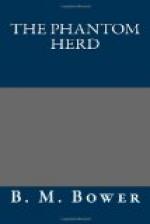“Sing low to your cattle, sing low to your steers—”
The words and the scene opened wide the door of memory and let whole troops of ghosts come drifting in out of the past. The hall, Luck roused himself to notice, was very, very still; so still that the sizzling sound of the machine at the rear was distinct and oppressive.
There was the blizzard, terrible in its biting realism. There was the old cow and calf, separated from the herd, fighting in the primal instinct to preserve themselves alive,—fighting and losing. There was that other, more terrible fight for existence, the fight of the Native Son against the snow and the cold. Men drew their breath sharply when he fell and did not rise again. They shivered when the snow began to drift against his quiet body, to lodge and shift and settle, and grow higher and higher until the bank was even with his shoulders, to drift over him and make of him a white mound—And then, when Andy staggered up through the swirl, leading his horse and shouting; when he stumbled against Miguel and tried to raise him and rouse him, a sound like a groan went through the crowd.
“Close a call as I ever had was in a blizzard like that,” the old man at Luck’s left whispered agitatedly to Luck behind his palm, when the lights snapped on while the operator was changing for the last reel.
There was Andy, haunted and haggard, at home again with his father. There were those dissolve scenes of the “phantom herd” drifting always across the skyline whenever Andy looked out into the night or rose startled from uneasy sleep. Weird, it was,—weird and real and very terrible. And, at last, there was that wonderful camp-fire scene of the Indian girl who prayed to her gods before she went to meet her lover who was dead and could not keep the tryst. There were heart-breaking scenes where the Indian girl wandered in wild places, looking, hoping, despairing—Luck had planned every little detail of those scenes, and yet they thrilled him as though he had come to them unawares.
He did not wait after the last scene faded out slowly. He slipped quietly into the aisle and went away, while the hands of the old-timers were stinging with applause. Halfway down the block he heard it still, and his steps quickened unconsciously. They were calling his name, back there in the hall. They were all talking at once and clapping their hands and, as an interlude, shouting the name of Luck Lindsay. But Luck did not heed. He wanted to get away by himself. He did not feel as though he could say anything at all to any one, just then. He had seen his Big Picture, and he had seen that it was as big and as perfect, almost, as he had dreamed it. To Luck, at that moment, words would have cheapened it,—even the words of the old cattlemen.
He went to his hotel and straight up to his room, regardless of the fact that it would have been to his advantage to mingle with his guests and to listen to their praise. He went to bed and lay there in the dark, reliving the scenes of his story. Then, after awhile, he drifted off into sleep, his first dreamless, untroubled slumber in many a night.




